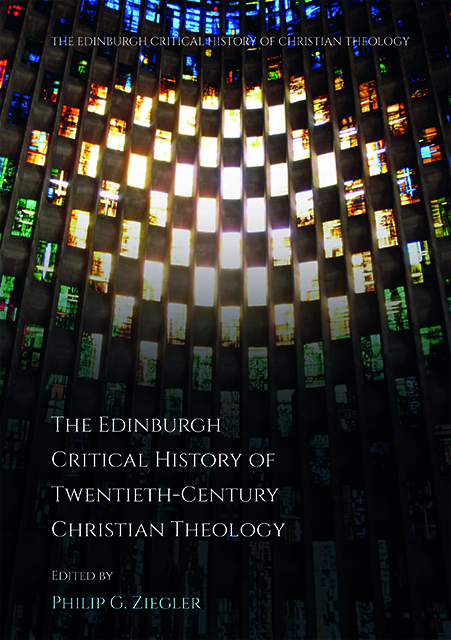Book contents
- Frontmatter
- List of Contents
- Notes on Contributors
- Editor's Introduction
- 1 Modern Theology in a Scientific, Historical Age
- 2 Tradition and Innovation
- 3 Scripture and Criticism
- 4 Reason, Method, System
- 5 Catholicism and Ecumenism
- 6 Fundamentalism and Evangelicalism
- 7 Synagogue, Sho’ah and State
- 8 Religion(s)
- 9 God
- 10 Spirit
- 11 Christ
- 12 Liberation and Freedom
- 13 The Secular – The Political: Augustine and Political Augustinianism in Twentieth-Century Political Theology
- 14 Globalisation after Empires: World Christianity and the Theological De-centring of Europe
- 15 War and Peace
- 16 Race and Black Theology
- 17 Sex and Gender
- 18 Hope
- Index
5 - Catholicism and Ecumenism
Published online by Cambridge University Press: 14 July 2023
- Frontmatter
- List of Contents
- Notes on Contributors
- Editor's Introduction
- 1 Modern Theology in a Scientific, Historical Age
- 2 Tradition and Innovation
- 3 Scripture and Criticism
- 4 Reason, Method, System
- 5 Catholicism and Ecumenism
- 6 Fundamentalism and Evangelicalism
- 7 Synagogue, Sho’ah and State
- 8 Religion(s)
- 9 God
- 10 Spirit
- 11 Christ
- 12 Liberation and Freedom
- 13 The Secular – The Political: Augustine and Political Augustinianism in Twentieth-Century Political Theology
- 14 Globalisation after Empires: World Christianity and the Theological De-centring of Europe
- 15 War and Peace
- 16 Race and Black Theology
- 17 Sex and Gender
- 18 Hope
- Index
Summary
To do justice to the history of Catholic ecumenism in a single essay is a daunting task. There are so many intertwining threads worthy of attention. Many of these revolve around friendships between Christians from different traditions. The stand-out examples are the pairs: Halifax and Portal, Halifax and Mercier, Barth and Balthasar, Hanselmann and Ratzinger, but there are numerous others stretching back into the nineteenth century, including the relationship between two of the most famous Victorians to convert to Catholicism, Ambrose Phillips de Lisle (1808–78) and George (Fr Ignatius) Spencer (1799–1864). If intellectual friendship was the most significant mode of ecumenical engagement, the most significant developments were the intellectual convergences on three fronts. First, Catholic scholars in the neo-patristic or ressourcement movement concluded that the causes of the Reformation lay in late Catholic scholasticism, and thus, in order to heal the schisms of the sixteenth century, it was necessary to revisit the late medieval debates, and to acknowledge the mistakes of that time. Second, there arose neo-patristic movements in both Catholicism and Eastern Orthodoxy with shared interests in Trinitarian anthropology and communio ecclesiology. Thirdly, Protestant theology took a decidedly anti-liberal turn after the First World War with the result that scholars from Catholic, Protestant and Orthodox traditions began to agree about the need for theology in all of its dimensions to be Trinitarian, Christocentric and biblical. Each of these three developments had an impact upon the drafting of documents at the Second Vatican Council (1961–5) and upon the ecumenical policies of the post-conciliar papacies, especially the papacy of Benedict XVI.
At the turn of the twentieth century the reigning pontiff was Leo XIII. He had a special interest in relations with the churches of Eastern orthodoxy and with the Catholic Uniate churches. In 1894 he produced two encyclicals on these topics. The first, Praeclara gratulationis publicae (‘On the Reunion of Christendom’) was primarily addressed to the representatives of Eastern Orthodoxy. This encyclical was criticised for its tone, perceived by some as patronising, but it did at least offer ‘an invitation to peace and reconciliation’. In Pope Leo's assessment, the papacy, not the understanding of the processions within the Trinity, was the major issue dividing the Eastern and Western branches of Christianity. He therefore exhorted those in the East to recognise the primacy of the Petrine office.
- Type
- Chapter
- Information
- Publisher: Edinburgh University PressPrint publication year: 2022



